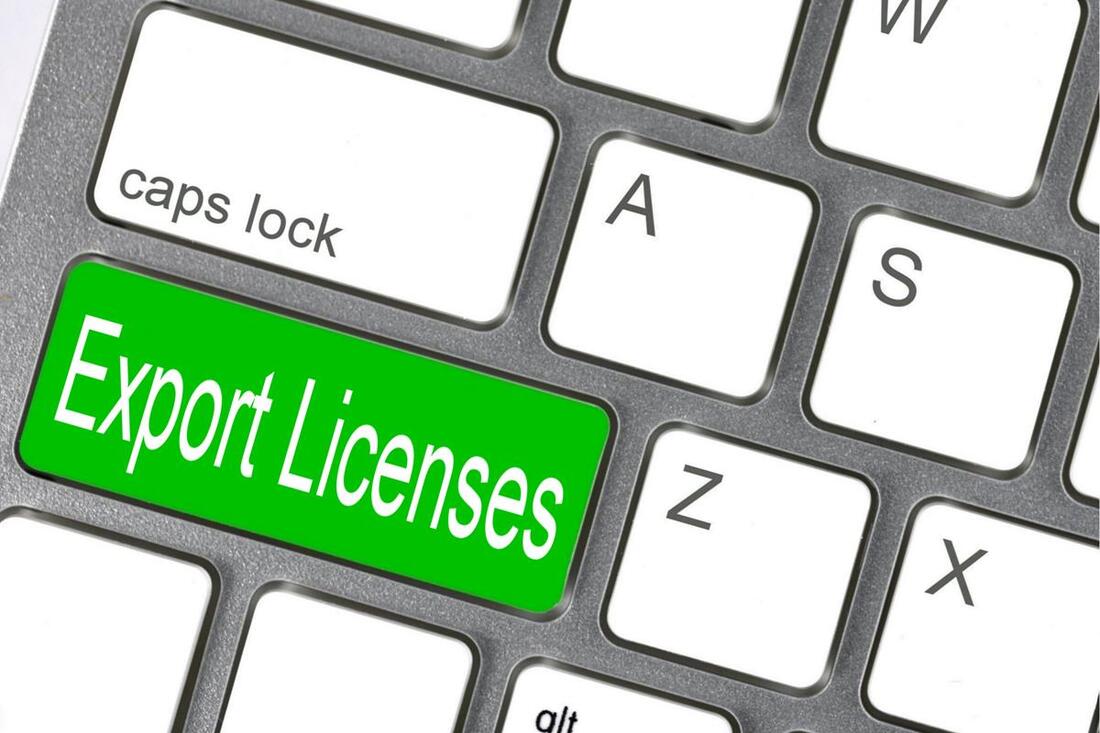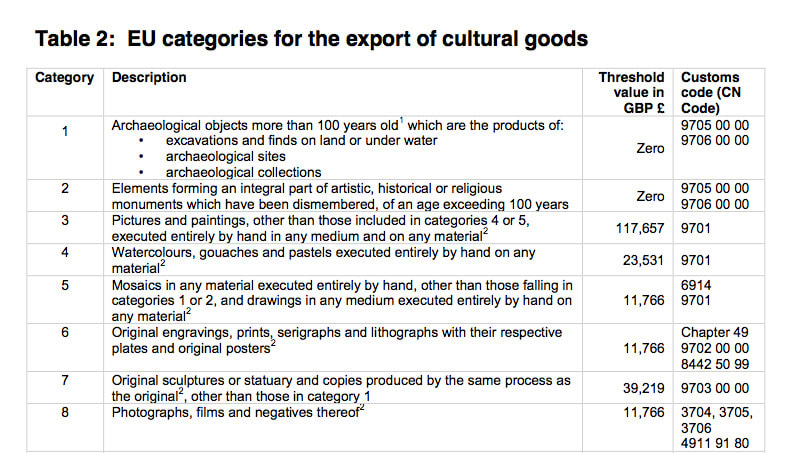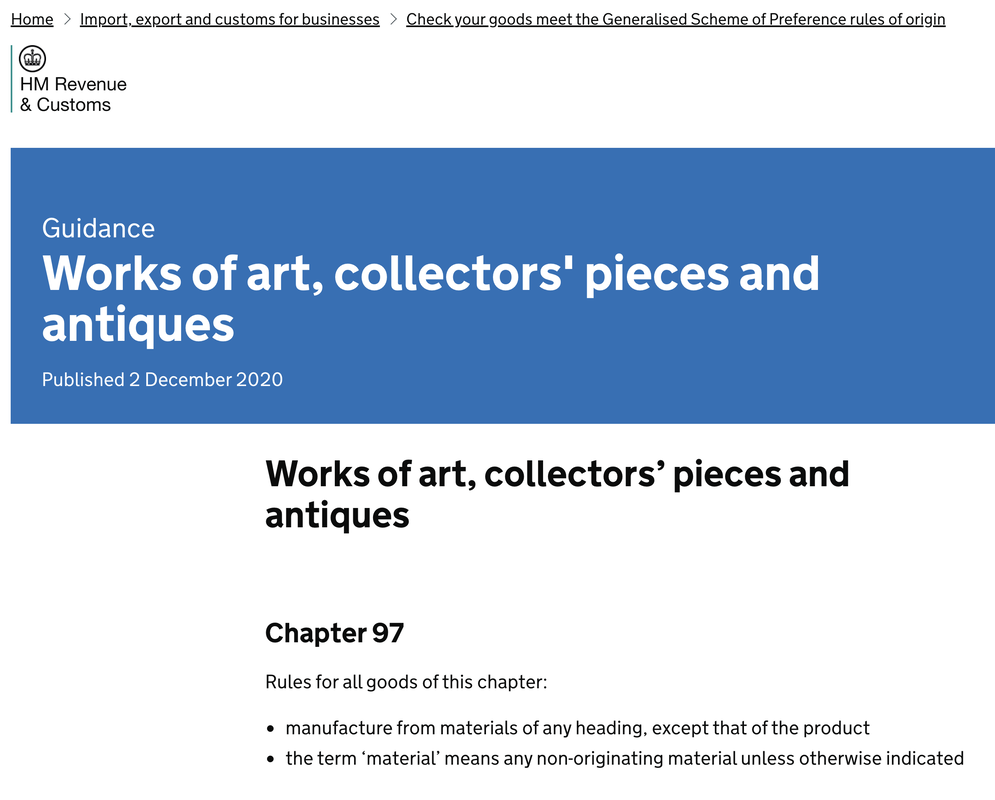- Home
- NEWS
-
PRACTICE
-
MARKETING
- How to write an Artist's Statement >
- How to write an Artist's Resume or CV >
- How to sign a painting, drawing or fine art print
- Business Cards for Artists
- How to write a press release for an artist
- The Private View Invitation
- Publicity for Juried Exhibitions
- Websites for Artists >
- Image & Video sizes for Social Media Sites
- How to be mobile-friendly
-
SELL ART
- FRAME ART
-
SHIP ART
-
COPYRIGHT
-
MONEY & TAX
- About + Help
- BANKING
|
This section covers Export Licences for Cultural Goods.
Specifically:
This page includes links to expert sources - including government websites. It continues to be a work in progress. |
WHAT IS AN EXPORT LICENCE?
|
You may need a licence to export certain ‘cultural goods’ over 50 years old.
Whether you need a licence depends on
|
Basic Process for Export Licences
What you need to do is different if you are: |
What are cultural goods?
Cultural goods are items of cultural interest. They may include:
- works of art
- furniture
- antiques
- means of transport
- manuscripts
- archaeological items
UK EXPORT LICENCES FOR CULTURAL GOODS
Export Licences after 1 January 2021 (post Brexit)
all objects of cultural interest manufactured or produced more than 50 years before the date of exportation require a UK licence under domestic export legislation.
Guidance on the export of cultural goods brought into the United Kingdom (UK) from outside the European Union (EU) but not released into free circulation (PDF)
|
REFERENCE: Export Licence for Works of Art and cultural goods
To export cultural goods from the UK you need to
The Threshold for requiring a UK Licence to export a painting is £180,000 |
REFERENCE:
|
Export Licence thresholds for export of cultural goods
- to countries outside the European Union
£ZERO THRESHOLDS
THRESHOLDS £10,000 - £50,000 (by value)
THRESHOLDS > £100k
- 1. Archaeological objects over 100 years old: £Zero
- 2. Elements of artistic, historical or religious monuments over 100 years old which have been dismantled: £Zero
- 8. Incunabula and manuscripts, including maps and musical scores, singly or in collections: £Zero
- 11. Archives, and any elements thereof, of any kind or any medium over 50 years old: £Zero
THRESHOLDS £10,000 - £50,000 (by value)
- 4. Mosaics other than those in categories 1 or 2, and drawings in any medium: £10,200
- 5. Engravings, prints, serigraphs and lithographs with their respective plates and original posters: £10,200
- 7. Photographs, films and negatives thereof: £10,200
- 10. Printed maps more than 200 years old: £10,200
- 3b. Watercolours, gouaches and pastels: £20,600
- 6. Sculptures or statuary and copies produced by the same process, other than those in category 1: £34,300
- 9. Books more than 100 years old: £34,300
- 12a. Zoological, botanical, mineralogical or anatomical collections or specimens: £34,300
- 12b. Historical, palaeontological, ethnographic or numismatic collections: £34,300
- 13. Means of transport over 75 years old: £34,300
- 14. Any other items more than 50 years old not included in categories 1 to 13: £34,300
THRESHOLDS > £100k
- 3a. Pictures and paintings, other than those included in category 3b or 4: £103,000
Export Licences in the UK - valuation and processes
Certain cultural goods that reach or exceed specific age and monetary value thresholds require an individual licence for export out of the UK – whether on a permanent or temporary basis.
Export Licensing | Arts Council
The provision of provenance by exporters for cultural objects that are intended for export, would appear to be a recurrent, contentious, and on occasions fractious issue for quite some time.
Notice on import proof, declarations and provenance (PDF)
The Export Licensing Unit of the Arts Council issues export licences on behalf of the Secretary of State in the UK.
The British Government seeks to keep items of particular cultural significance in the UK. Consequently there are export controls on art and other significant items.
The British Government seeks to keep items of particular cultural significance in the UK. Consequently there are export controls on art and other significant items.
The UK government retains the right to defer the granting of an export license. This is used to delay the export of items deemed of national importance under specified criteria in order to allow time for funds to be raised to keep them in the UK.
Waverley Criteria
EXPORT LICENCES: Articles by government / agencies / reputable organisations
These are the rules. They are NOT NEGOTIABLE.
These are the rules. They are NOT NEGOTIABLE.
- Export art, antiques and cultural goods: special rules | GOV.UK - How to apply for a licence to export cultural goods, including antiques, furniture and archaeological items.
- Export Licensing | Arts Council (UK) - - provides information and guidance about export licences. Certain cultural goods that reach or exceed specific age and monetary value thresholds require an individual licence for export out of the UK – whether on a permanent or temporary basis.
- Notice on import proof, declarations and provenance | Arts Council (PDF) - Notices for exporters includes one relating to import proof, customs declarations and statements and proof of provenance
- Procedures and guidance for exporters | Arts Council (2016)
REFERENCE: These are related articles:
- Export Licences | Antique Trades Gazette - When art and antiques are bought and sold above certain the value thresholds, it is necessary to obtain licences to export these items from the UK.
- UNESCO holds a unique round table on regulation, cooperation and diligence of professionals for cultural heritage protection
EXPORTING CULTURAL GOODS FROM FRANCE
France has changed its export licensing system for cultural goods, increasing the value thresholds and removing some red tape. |
REFERENCE:
|
ABOUT ART BUSINESS INFO. FOR ARTISTS
This website aims to provide a compendium of resources about the art business for artists. Please read "PLEASE NOTE"
It helps artists learn how to do better at being business-like, marketing and selling their art and looking after their financial security.
This website aims to provide a compendium of resources about the art business for artists. Please read "PLEASE NOTE"
It helps artists learn how to do better at being business-like, marketing and selling their art and looking after their financial security.
|
Copyright: 2015-2021 Katherine Tyrrell | Making A Mark Publications
- all rights reserved If you've got any suggestions for what you'd like to see on this website please send me your suggestion
|
PLEASE NOTE:
1) Content and the law change all the time. It's impossible to keep up with it if you're not working on the topic full time. 2) I research topics carefully. However, I am totally unable to warrant that ANY and/or ALL information is
|
3) Hence all information I provide comes without any LIABILITY whatsoever to you for any choices you make.
4) This website is FREE FOR YOU but not for me. Links to books are Amazon Affiliate links. Buying a book via this website means I get a very small payment which helps to fund and maintain this website. .I much appreciate any support your provide. Adverts are provided by Google AdSense - but the adverts do not mean I endorse the advertiser. |
- Home
- NEWS
-
PRACTICE
-
MARKETING
- How to write an Artist's Statement >
- How to write an Artist's Resume or CV >
- How to sign a painting, drawing or fine art print
- Business Cards for Artists
- How to write a press release for an artist
- The Private View Invitation
- Publicity for Juried Exhibitions
- Websites for Artists >
- Image & Video sizes for Social Media Sites
- How to be mobile-friendly
-
SELL ART
- FRAME ART
-
SHIP ART
-
COPYRIGHT
-
MONEY & TAX
- About + Help
- BANKING


